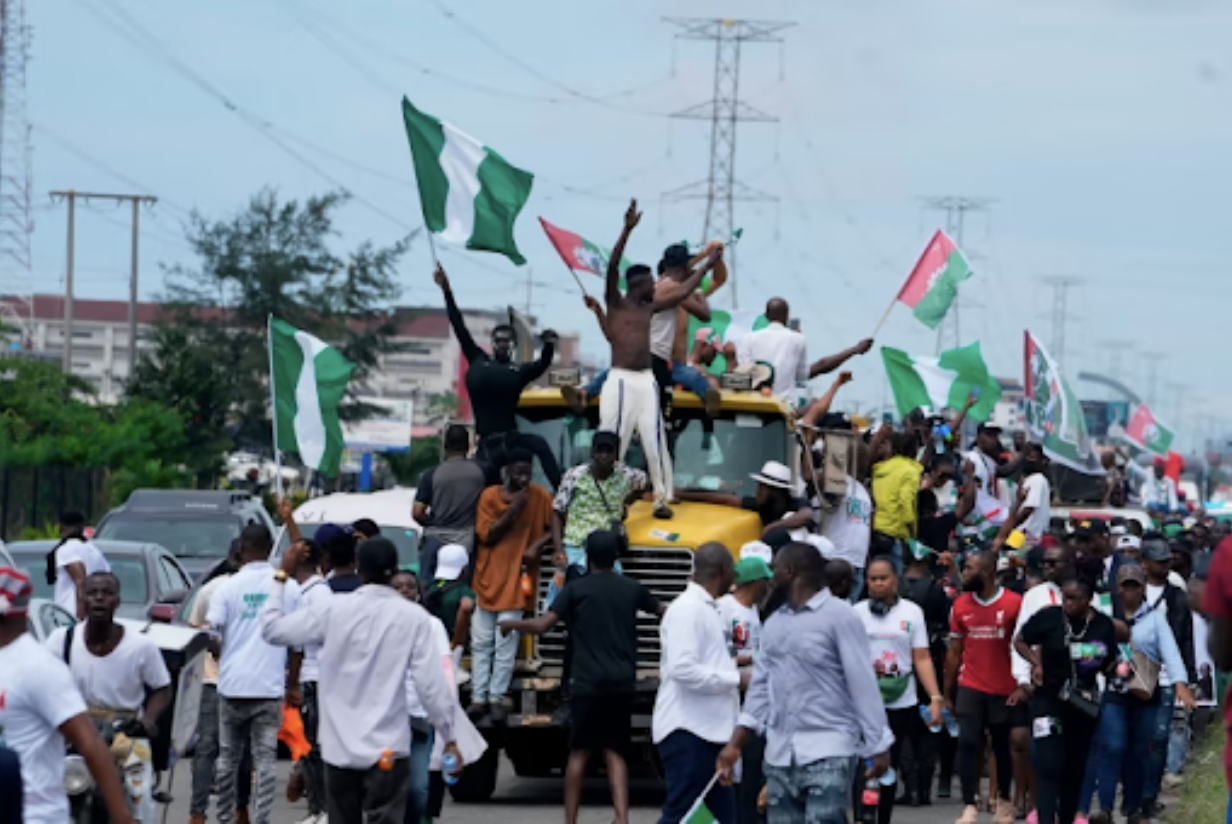The New Push for Progressivism in Nigeria
Photo Credit: AP/Sunday Alamba
Despite being rich in natural resources, postcolonial sub-Saharan African nations aren’t often known for universal well-being. Even in Nigeria, Africa’s largest economy, this has held true. However, the nation’s people are beginning to come to terms with the fact that it may be time to do away with the status quo and pursue a new direction if progress is to be made.
Nigeria has been a nation on the downturn in recent years. Issues with food shortages, power outages, terrorist threats from Boko Haram, and an abusive policing and military system have only been exacerbated by the COVID-19 pandemic, as well as the resulting global economic inflation. Making a pot of Jolloff rice, for example, costs twice the amount that it did in 2016, an economic burden that’s only made worse with the fact that 4 out of 10 Nigerians live below the national poverty line. Simultaneously, many in Nigeria still lack access to basic infrastructure, such as electricity, sanitation, and drinking water, let alone internet access or quality roads. During the current president’s eight years in office, youth voters were highly disenfranchised– these years were remembered for two recessions, a 33% unemployment rate, and widespread protests over police brutality. As such, the upcoming presidential election on February 25th is sure to be pivotal in determining the future of the nation.
Since 1999, Nigeria’s presidential office has swung back and forth between two parties: the Peoples Democratic Party (PDP) and the currently-in-power All Progressives Caucus (APC). However, a rapidly emerging Labour Partybacked by trade unions and with large swaths of youth support is gearing up to potentially disrupt this status quo in 2023. Pushing former state governor Peter Obi as their presidential candidate, projections from sources including Bloomberg News affirm the possibility or even likelihood of a win for the Labour Party in the upcoming election. But how did the Labour Party, a much more minor group in Nigeria in the past, rise to such prominence so quickly, and why is it that Nigeria’s people are so intent on disrupting the status quo with new leadership?
The Nigerian Labour Party was first established in 2002, originally called the Party for Social Democracy (PSD). The party initially saw very little electoral success in the nation, only claiming one prominent elected official (a state governor) before 2023. Primarily, it has served as a third party option for those defecting from one of the two major parties, yet Obi’s switch from the PDP to the Labour Party seemed to breathe new life into the previously failing party. Despite receiving little more than a few thousand votes in previous election cycles, Obi’s candidacy appears to be a potential breakthrough for the Labour Party; in fact, many sources including Bloomberg News have affirmed that a win for Obi is more likely than not.
Much of what sets Obi’s campaign style apart is his ability to appeal to youth voters. Obi’s specific campaign messages and targeting of Nigeria’s vibrant young voter base is largely what has been able to drum up massive support. Nigeria, after all, maintains an extremely young population– 70% of its people are aged 30 or below. Even further, 10.5 million new voters will help to determine the election this year– many of whom are fed up with the status quo of politics in the country. Both other prominent presidential candidates in the upcoming election cycle are septuagenarians, 70 and 75 to be exact. Not only that, but both are career politicians that are seen as merely continuing on the circumstances that have already pushed the nation further into disarray. Obi’s slogan and message of “Dis-OBI-dience” to the current system has been central to his campaign, and this resonates heavily with a younger generation.
On a similar note, Obi has also put an emphasis on dismantling corruption. Nigeria ranks 150th globally in the Corruption Perceptions Index, and Obi’s campaign has put a strong degree of emphasis on changing this. A key issue that’s been culturally significant in Nigeria is the idea of political “godfatherism,” in which a previously high-ranking elected official endorses others for high-ranking political positions as a form of maintaining power in the political system– with the expectation that the endorsee will serve their agendas– even when the endorser is not in office themselves. In fact, in many Nigerian states, a campaign without at least some indication of support from a political godfather is seen as one that is destined to fail. Though not the only country to have such a system, Nigeria’s system of godfatherism is one that has been notably fraudulent: bribery, blackmail, and censorship have all been deeply involved with the process. As a result, there has been a consistent cycle of past politicians essentially staying in power despite not being in office in the present day.
Obi himself is seen as a figure emblematic of defying godfatherism: when running for governor in his own home state of Anambra, Obi directly fought against a godfather-backed candidate and won– only after initially losing in a rigged election and taking his case to court. In office, he even endured an impeachment due to being “too frugal” with government funds, which was once again ruled as unlawful in the court system. His past history of fighting against Nigeria’s electoral status quo– and winning– is extremely appealing to the young population of the country, especially when his campaign focuses on accountability and finding real solutions to issues affecting the common person in Nigeria. Already, his campaign has detailed plans to fight fuel shortages, inflation, and a disadvantageous exchange rate for the Nigerian naira.
Time will tell if the new political movement in Nigeria will win out. As issues affecting the livelihoods of the nation’s people continue to plague the country, Obi’s messages of defying the status quo and increasing transparency and accountability will serve as important reminders for the people of Nigeria– irregardless of if he wins or loses.
